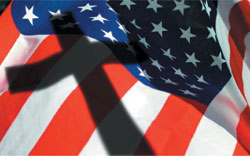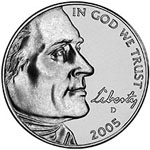Tracking the ‘culture wars’

‘America the sacred’ and ‘America the secular’
locked in battle
By Bruce T. Murray
Author, Religious Liberty in America: The First Amendment in Historical and Contemporary Perspective
† The Texas State Board of Education recently approved new social studies standards that call into question the doctrine of separation of church and state.
† Voters in the city of Lancaster, Calif., overwhelmingly approved a measure in favor of the City Council’s practice of opening its meetings with prayer.

‡ Congress passed a resolution ordering the inscription of the words, “In God We Trust” and “One nation under God” in prominent areas of the new Capitol Visitor Center in Washington, D.C.
Events in Texas have generated substantial controversy; and both the Lancaster measure and the Capitol Visitor Center issue have elicited lawsuits.
All of these developments represent, in various forms, reactions and counter-reactions to the decades-long trend toward the removal of religious symbols and expression from the public sphere. The ongoing self-regenerating conflicts are part of the broader “culture wars” in America, pitting those who favor greater inclusion of religious expression in public life against those who favor secularization and a strict separation of church and state. The battles are fought out in the courts, the media and the public square (i.e. “Happy Holidays” vs. “Merry Christmas.”)
 The University of Massachusetts Press book, Religious Liberty in America: The First Amendment in Historical and Contemporary Perspective by Bruce T. Murray, analyzes the culture wars in the context of America’s longstanding debate over religion in public life. The controversy, as Murray shows, is nothing new. For more than 200 years, Americans have disagreed about the proper role of religion in public life and where to draw the line between church and state. In this volume, Murray re-examines these debates and distills the volumes of commentary and case law they have generated.
The University of Massachusetts Press book, Religious Liberty in America: The First Amendment in Historical and Contemporary Perspective by Bruce T. Murray, analyzes the culture wars in the context of America’s longstanding debate over religion in public life. The controversy, as Murray shows, is nothing new. For more than 200 years, Americans have disagreed about the proper role of religion in public life and where to draw the line between church and state. In this volume, Murray re-examines these debates and distills the volumes of commentary and case law they have generated.
“As an issue that touches almost every human life – in America and beyond – the debates about religious freedom and their applications are far from ‘purely academic’, rather they have real, on-the-ground consequences. It seems necessary then that the history and current concerns regarding religious freedom in America be clearly understood prior to weighing in on the contentious contemporary debates. This is precisely the task of Bruce T. Murray’s 2008 work, Religious Liberty in America; one that he accomplishes with impartiality and insight.”
—Brandon M. Crowe, Ph.D., School of Historical, Philosophical and Religious Studies, Arizona State University
(from Reviews in Religion & Theology, History and Sociology of Religion, Wiley-Blackwell Publishing, Vol. 17, Issue 2, 2010)
Religious Liberty in America is available at libraries across North America, and it may be purchased from the University of Massachusetts Press.
Read about the author here.
News
Gingrich defines culture wars
“The crisis of European civilization [is] militant, government-imposed secularism undermines and weakens Christianity. American elites are guided by their desire to emulate the European elites, and as a result, anti-religious values and principles are coming to dominate the academic, news media and judicial class in America.” — Newt Gingrich in a 2011 speech to the National Catholic Prayer Breakfast in Washington, D.C.
News updates on the Capitol Visitor Center
Atheists sue to keep ‘God’ out of visitor's center
The Freedom From Religion Foundation has filed a federal lawsuit to remove engravings of the words, “In God We Trust” and “one nation under God” from the new Capitol Visitor Center. The FFRF contends the Congressional appropriations for the Visitor Center “will give actual and apparent government endorsement and advancement of religion, while excluding nonreligious Americans. ‘In God We Trust’ excludes and treats as outsiders the millions of adult Americans, including as many as 15 percent of all adults, who are not religious ... The mandated language diminishes nonbelievers by making god-belief synonymous with citizenship.”
U.S. lawmakers defend ‘God’ in visitor's center
Numerous members of Congress signed a legal brief urging dismissal of a lawsuit aimed at removing inscriptions containing the word “God” in the newly constructed Capitol Visitor Center. “While the First Amendment affords atheists complete freedom to disbelieve, it does not compel the federal judiciary to redact religious references in every area of public life in order to suit atheistic sensibilities,” according to a friend-of-the-court amicus brief filed by the American Center for Law and Justice, and signed by three U.S. senators and 41 representatives. “Under existing case law, there is very little upon which to stake an argument that displaying either the national motto or the Pledge of Allegiance violates the Establishment Clause. All authority on point is against such a contention. The Establishment Clause was never intended as a guarantee that a person will not be exposed to religion or religious symbols on public property, and the Supreme Court has rejected previous attempts to eradicate all symbols of this country's religious heritage from the public's view.”
Congress passes bill ordering ‘God’ mottos
The House and Senate passed a resolution directing the Architect of the Capitol to engrave the Pledge of Allegiance to the Flag and the National Motto of `In God we trust’ in the Capitol Visitor Center. “The Founders based the Constitution and our laws on religious faith and principles that clear the way for individual freedom,” said Sen. Jim DeMint, R-S.C., who sponsored the bill in the Senate. “Our true motto, 'In God We Trust,' expresses this fact, and we cannot allow a whitewash of America's religious heritage.”
‘Shrine to political correctness’
The new Capitol Visitor Center has a "sin of omission," according to some members of Congress: The center's replica of the House chamber does not contain the words, "In God We Trust," even though those words are inscribed above the speaker's rostrum in the real chamber. In a letter to the center's architect, lawmakers wrote, “None of us should want to construct a $621-million shrine to political correctness that does not accurately reflect a significant part of American history.”

